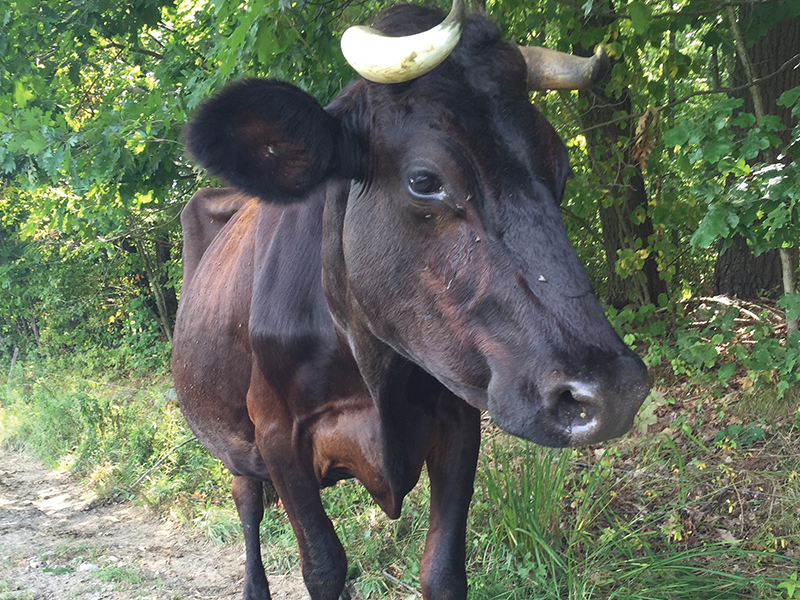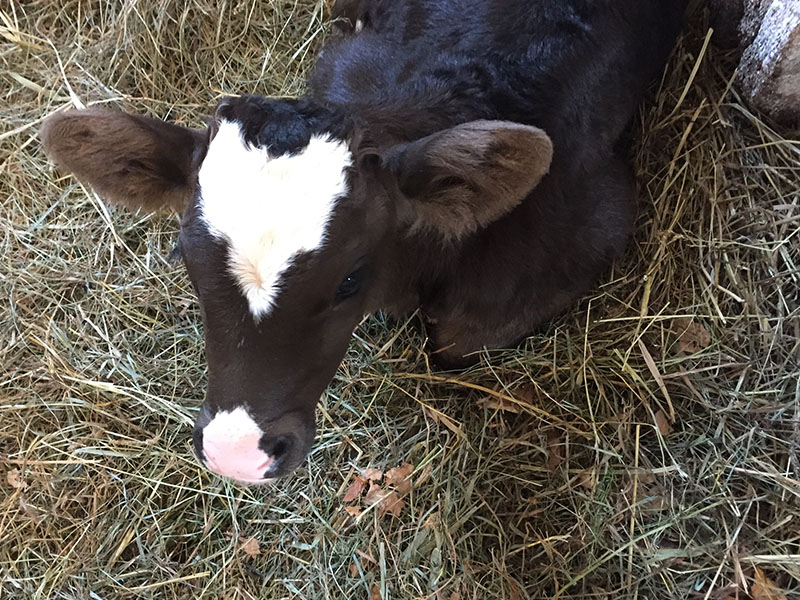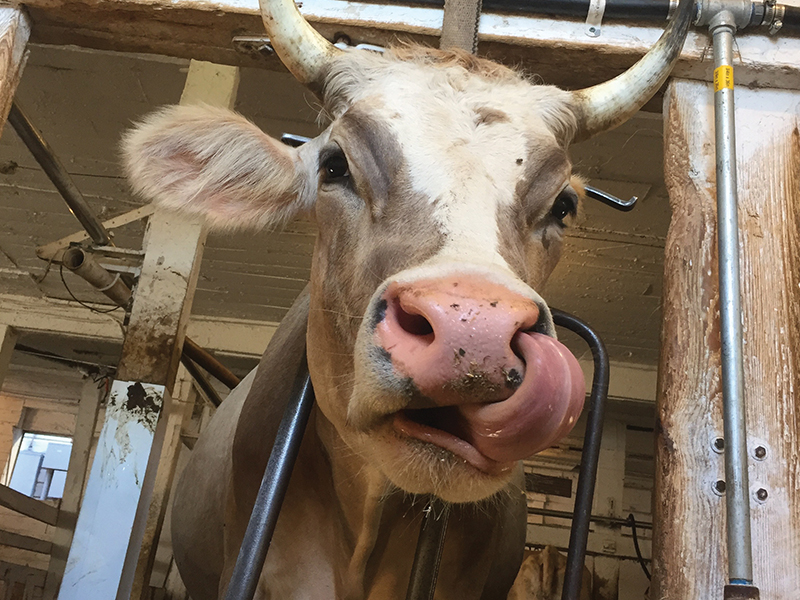At the heart of the farm is the herd of 70 grass-fed dairy cows, providing the pulse, rhythm and the basis for the fertility of the farming operations.
The cows
The cows furnish most of the milk for our Organic and Biodynamic® creamery. All of the cows are mixed-breed — a mix of mostly Brown Swiss, with a little Jersey, Guernsey, Devon and Normande mixed in. In a sense, our cows have developed into a farm-specific breed of their own, born from our selection for cows that thrive on our home-grown forages, have good legs for walking out to pasture, and — perhaps most important of all with as many visitors as we have at the farm — cows with a gentle disposition. As far as milk quality is concerned, we appreciate the higher fat and protein content through the Brown Swiss, Jersey and Guernsey influence — ideal for making our cheeses and yogurts, and all the better for a nice cream line on our raw milk. The addition of the Normande breed to the herd in 2017 has also improved our cheese quality, as well as the meat quality of the animals. We are striving to raise truly dual-purpose cows that can thrive on 100% pasture and grass forage, producing the highest quality milk and meat.
The products that we make from our certified Organic and Biodynamic cows’ milk can be enjoyed with the assurance that our cows are grass-fed on our pastures throughout the spring, summer and fall. In late fall and winter, they are fed on our homegrown Biodynamic dry hay and fermented baleage, supplemented with salt, minerals and kelp. They are given no hormones or antibiotics and are tended with gentle, caring, knowledgeable hands. Farmers and apprentices know all the animals’ names and personalities, helping us to manage both individual cow and herd well-being. Calves are given names that begin with the same first letter as their mother: “Winona’s” calves are named “Wren” and “Winter”. This allows us to keep track of family lineage and family characteristics within the herd. Hawthorne Valley Farm has a “closed” herd, which means that we do not buy in cows as a rule; we raise our own calves for our future herd, with the rare exception of introducing future bulls as calves every few years. We do not use artificial insemination to breed our animals.
Calves
In 2007, we began raising our newborn calves with their mothers, a practice that is virtually unheard of in the modern dairy industry. Having young calves pasture with the milking herd allows them to learn to graze from the mother cows, even when they are still feeding primarily on their mother’s milk. As the calves mature, their stomachs change from having a milk-only digestion process to the full ruminant four-stomach digestion system, allowing the calves to begin eating fresh grass and hay while they are still with their mothers. Recently we have also begun to raise calves on “nurse moms”, giving cows with good mothering instincts a break from the daily milking routine and allowing them to raise two or three calves each.
Our farmers have noticed the calves that are raised with the cows are stronger, bigger, and healthier overall. The herd dynamics, with the calves running and jumping and laying down to rest near the mother cows, have had a positive change in which the herd, as a whole, seems calmer and more settled. We believe that the vibrancy of the farm is strengthened through this calf rearing, by honoring the natural life processes of the cow, an essential part of honoring the five freedoms of domesticated animals.
Cows and their Horns
Visit our farm, or view the slide show at the top of the page, and you’ll probably notice something special about our cows: They all have horns! It is common practice for conventional dairy farmers to ‘disbud’ calves early in life so that their horns never develop. They do this mainly because they feel it reduces the danger of injuries, particularly for cows kept in close housing. We think horns are essential to the animal expressing her authentic being, and there is research that shows not only are the cows’ horns linked to the animal’s digestive process, but they may also enhance the quality of the cows’ milk. If you are interested in learning more on this topic, click the link for a comprehensive article, “Why Cows Have Horns.”
Cows and Compost
The wintering of the dairy herd, from November to the end of April, provides an opportunity for the farmers to collect large quantities of manure. We collect this manure in a ‘deep bedded pack’, where each day we add a fresh layer of homegrown hay and straw to the cows’ loafing area. This pack grows up about five feet deep each winter. The resulting material is a rich compost medium, emptied out in the summer and fully composted on our farm using biodynamic methods. This compost is the only fertilizer used on the farm, and is used to fertilize our nutritious vegetables, pastures and field crops. Some of these hay and straw crops are destined to be the next winter’s bedding material, completing the farm’s nutrient loop.















